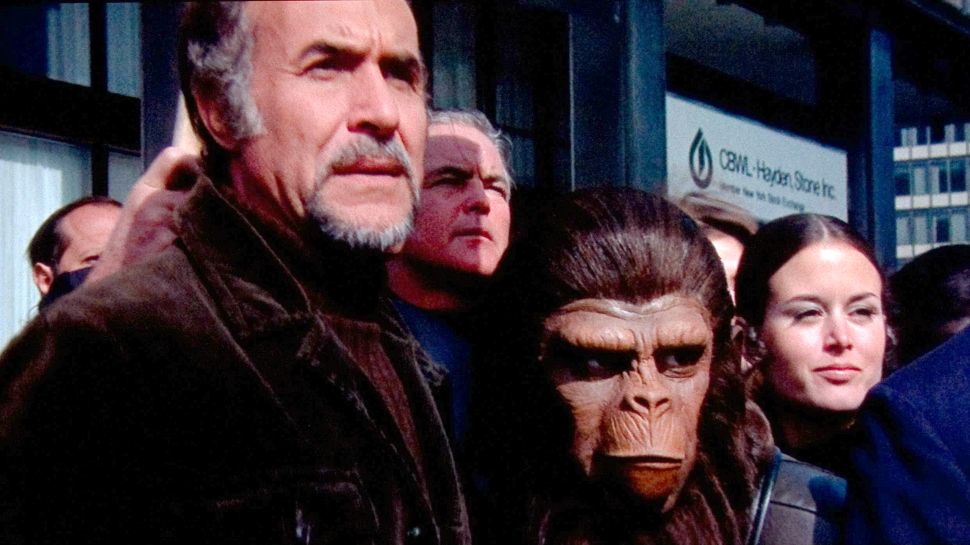DIRECTED BY J. LEE THOMPSON/1972
 Conquest of the Planet of the Apes is the third sequel to 1968’s The Planet of the Apes (following Beneath the Planet of the Apes and Escape from the Planet of the Apes) and it hits nearly as hard in its social commentary as the original. History has consigned the sequels to Charlton Heston’s sci-fi hit to the amusing source of trivia bin, but Conquest’s message of how thoughtless subjugation leads to violent uprising is one we should be paying attention to these many years later.
Conquest of the Planet of the Apes is the third sequel to 1968’s The Planet of the Apes (following Beneath the Planet of the Apes and Escape from the Planet of the Apes) and it hits nearly as hard in its social commentary as the original. History has consigned the sequels to Charlton Heston’s sci-fi hit to the amusing source of trivia bin, but Conquest’s message of how thoughtless subjugation leads to violent uprising is one we should be paying attention to these many years later.
Conquest takes place in ‘the future’ (1991!). Apes have taken their place as humanity’s domesticated pet of choice, as all of the dogs and cats (and gerbils too, one supposes) have died off due to some mysterious plague. The apes’ greater intelligence and dexterity have led humans to treat them more like slaves, rather than as close companions. Bright as they are, the apes have a limited sense of how wrong their situation is.
There is one ape, however, that can see things clearly, Caesar (Roddy McDowall). Caesar is the child of Cornelius (also Roddy McDowall) and Zira (Kim Hunter), two apes from the future who escaped from their doomed world via a time machine in the previous film. Caesar’s parents were killed by a world that feared what a sentient talking ape might mean for the future of humanity. Caesar was taken into hiding by a kindly circus owner, Armando (Ricardo Montalban), and Armando has served as Caesar’s guardian and protective father-figure ever since.
Roddy McDowall’s performance is the strong central spine of the film, and he communicates so much of Caesar’s inner life, even through the layers of latex McDowall had to wear.
When Armando brings Caesar into the city for the first time, the young ape sees how his fellow apes are mistreated, and this stirs in him righteous anger. He yells out when the fascistic Ape Control Authority publicly punishes an ape for screwing up. Armando takes the blame for Caesar’s outburst to protect his young charge and is arrested. Caesar is forced to flee and go into hiding among his own kind to keep the secret that he is a talking ape. Luckily, Caesar also speaks fluent ape, and is able to blend.

Once among the other apes, Caesar gets a firsthand look at how human society is built on the labors of the apes. Apes are tortured and conditioned to associate the word ‘no’ with pain. They are beaten when they make mistakes, and are overall treated… well, I was going to say ‘like animals,’ but I think most people would be horrified to see animals treated in such manner. If the apes were animals, this would be problematic enough, but the government is getting reports that the apes’ intelligence is increasing.
The government of the city, led by Breck (Don Murray) is frightened of the prospect of an ape revolution. They recognize the dangers an ape like Caesar represents to their power. They’re not wrong. When given the chance, Caesar begins forming a Fight Club-like cell of apes. Initially they begin by minor acts of rebellion, but soon the group is collecting guns and other weapons. It is clear Caesar does not believe the change he wants to see happen will occur peacefully.
The movie builds up to the final ape revolution. Apes storm the streets under Caesar’s command with the full intent to burn everything down and give, what Caesar proclaims, “birth to the Planet of the Apes!” It’s an incendiary call to arms for those whom the system treats as disposable chattel, a message that resonates almost as loudly today in the wave of movements like Occupy and Black Lives Matter as it did during the early 1970’s. When those in power have no interest in listening to the voices of the most downtrodden, anger and distrust will erupt and violently so.

The final cut of the movie undercuts this potent message, however. The studio, fearful of what ideas they thought people might take away from this (and Conquest’s message is not at all subtle), changed the ending of the film to a more conciliatory tone (clearly in post-production). This takes a lot of the teeth out of the final act of the film, changing Caesar’s call from one of revolution to one of ‘let’s all just get along.’
Conquest was shot cheaply. It’s budget was significantly reduced from its predecessors and it shows. Even watching this movie on a small screen, the ape makeup (aside from Caesar’s) is rough, and it appears the whole movie takes place within the same 2 city blocks (all the exteriors were mostly shot around the University of California in Irvine). Still, the movie makes good use of whatever limited resources it had. Roddy McDowall’s performance is the strong central spine of the film, and he communicates so much of Caesar’s inner life, even through the layers of latex McDowall had to wear.
Conquest of the Planet of the Apes may not be as iconic as the first Planet of the Apes movie, but it is just as good. It is also, sadly, speaks just as loudly to us in 2017 as it did back when it was first released in 1972.


